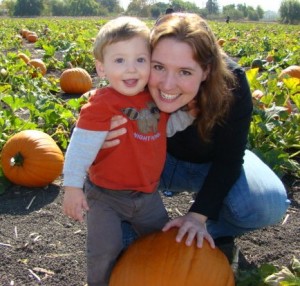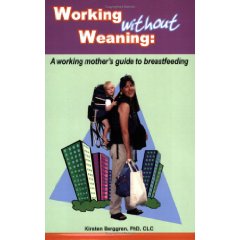By Chandra Hamilton
 As each new talent emerges, toddlers get busy and forget to do lots of things: watch in front of them when moving, pick up toys before stepping on them, and eat. They fight the fork, the spoon, and even self-feeding in an effort to get back to their most important work: play.
As each new talent emerges, toddlers get busy and forget to do lots of things: watch in front of them when moving, pick up toys before stepping on them, and eat. They fight the fork, the spoon, and even self-feeding in an effort to get back to their most important work: play.
Some toddlers make up by nursing even more at night. Sometimes this continues to work for both mother and toddler. Sometimes, however, Mother chooses to night wean.
In this case, night weaning led to day weaning, and soon, my toddler was completely off the breast long before I ever considered the idea.
Our Story
When Ryan was 15 months old, we decided to move. (May I just point out, this is total chaos and I never recommend it!) We packed up everything we owned and drove four hours north. This move from the familiar into the unknown turned my toddler’s world upside-down. He didn’t know where he was, where any of his toys were, where his dogs were, and most importantly, he didn’t understand why Mommy had been less than 100% attentive in the weeks leading up to the move. Since he was mobile, self-feeding, and easily entertained, my attention had been focused on working and packing.
So, slowly but surely, one feeding would slip through the cracks, then another and another.
At the same time, we gave up night nursing. As a family, we decided that Ryan’s continued and constant night nursing wasn’t working. As he became a busy toddler, he became what I like to call a “full-body” nurser. What I mean by this is that he no longer just nursed with his mouth, he rubbed my belly with his hand, kicked with his feet, and screamed every time I even considered taking him off the breast so I could roll over and sleep myself. When he was an infant, night nursing was a joy. But as he grew more adept with his body, it became a challenge.
One thing led to another, and the next thing I knew, my toddler had not asked to nurse and I had not offered in several days. He did take a few weeks to wean completely; it was a gradual and gentle weaning.
But I found myself missing the time we spent together. My baby was gone, and a cranky toddler had replaced him. And though I love the new skills and fun this age provides, I missed my little boy.
I felt rejected — that I was less than the mother I used to be. How can I possibly be an attached parent if I didn’t breastfeed past the 16th month? And the guilt — oh, the guilt! I’ve selectively vaccinated my son — is he now set to get polio since he’s weaned? Do I have to skip ahead and vaccinate like crazy to catch up now that he won’t be getting breastmilk anymore? These are just a few of the questions bouncing around in my mind.
Nursing had always been my go-to fix for anything Ryan needed. Fell down and bumped your knee? Nurse. Bored and cranky because we’ve had to wait too long for an appointment? Nurse. Tired and distracted and just need some time to get centered? Nurse.
With weaning, like all transitions, I had to learn how to interact and care for this new person in my life. This independent, yet fragile, little boy still needed my love and support, and I had to figure out some other way to be there for him without offering the breast.
Easing the Transition
Here are a few tips that have worked for us:
- Make up for the missed breastfeeding time by having extra cuddle time — Sleep with your toddler even after the nursing is gone.
- Have special before-bed and wake-up time — that involves singing, cuddling, and the same undivided attention you would have given had you been nursing.
- Consider bottle nursing — If you are comfortable with it, cow’s milk or water in a bottle can be tempting enough for some toddlers to allow lap time, even if it is only once a day.
- Pick a special song or two just for boo-boos — When Ryan gets hurt, I pull him onto my lap and sing very softly and close to his ear the same song every time. He seems to get a sense of comfort from this. He knows that he has been upset or hurt before, and by the end of the song everything seems a little bit easier to handle.
- Acknowledge and mourn the passing of one stage, but celebrate and rejoice in this new one — It is okay to feel sad and miss that small bundle who depended on you for everything. It is also normal to feel happy and relieved that you are no longer the only one who can provide this comfort for your child. Allow yourself some time to just stop and feel.
I know that Ryan still loves me, needs me, and can’t imagine a day without me. And I know that like all things in life, this too shall pass. Sometimes, though, I wish some things — like breastfeeding — wouldn’t pass so quickly!


 As each new talent emerges, toddlers get busy and forget to do lots of things: watch in front of them when moving, pick up toys before stepping on them, and eat. They fight the fork, the spoon, and even self-feeding in an effort to get back to their most important work: play.
As each new talent emerges, toddlers get busy and forget to do lots of things: watch in front of them when moving, pick up toys before stepping on them, and eat. They fight the fork, the spoon, and even self-feeding in an effort to get back to their most important work: play.